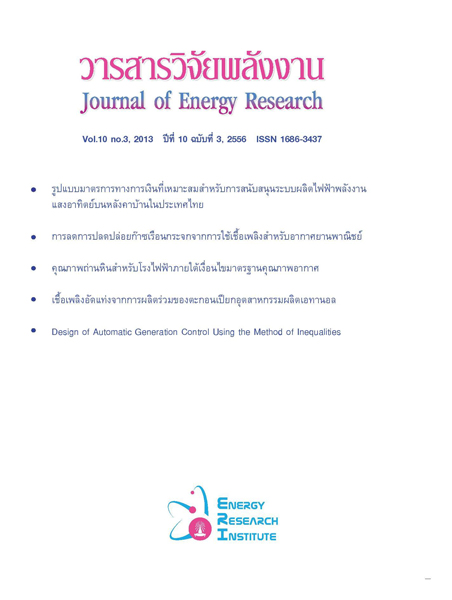การลดการปลดปล่อยก๊าซเรือนกระจกจากการใช้เชื้อเพลิงสำหรับอากาศยานพาณิชย์
Main Article Content
Abstract
การวิจัยครั้งนี้เป็นการศึกษาการปล่อยก๊าซเรือนกระจกที่ปล่อยออกมาจากการสันดาปเชื้อเพลิงของอากาศยานพาณิชย์ซึ่งส่งผลกระทบต่อการเปลี่ยนแปลงภูมิอากาศ วัตถุประสงค์ของการศึกษาเพื่อวิเคราะห์การใช้พลังงานและการประเมินการปล่อยก๊าซเรือนกระจกของอากาศยานพาณิชย์ของประเทศไทยภายใต้วงจร Landing and Take-Off (LTO) และขณะทำการบินโดยทำการวิเคราะห์และประเมินข้อมูลในปีฐาน คือปี 2011 ผลการศึกษาพบว่าปี 2011 ปริมาณการใช้เชื้อเพลิงฟอสซิลคือ 495,037.13 ตัน และปลดปล่อยก๊าซเรือนกระจก 1,577,922.75 ตันคาร์บอนไดออกไซด์เทียบเท่า และพยากรณ์การใช้เชื้อเพลิงต่อไปในปี 2012- 2020 โดยประเมินจากมาตรการการลดก๊าซเรือนกระจกต่างๆในการทบทวนระยะสั้นนั้น การเปลี่ยนแปลงเทคโนโลยีไม่สามารถประสบความสำเร็จตามเป้าหมายของข้อกำหนดปริมาณการปลดปล่อยก๊าซเรือนกระจก เชื้อเพลิงชีวภาพเป็นหนึ่งในแนวทางที่มีแนวโน้มมากที่สุดที่สามารถตอบสนองสายการบิน ในการลดการปลดปล่อยก๊าซเรือนกระจก และลดความเสี่ยงจากราคาเชื้อเพลิงฟอสซิลที่ผันผวนและสูงขึ้น ผลการศึกษาครั้งนี้ จึงเป็นแนวทางในการพัฒนาเทคโนโลยี และการลดการปลดปล่อยก๊าซเรือนกระจกอย่างยั่งยืน รวมถึงเพื่อเป็นข้อมูลประกอบการพิจารณา การจัดการ เพื่อเพิ่มประสิทธิภาพการใช้พลังงานในภาคขนส่งทางอากาศ
ENERGY-RELATED GREENHOUSE GAS MITIGATION FOR COMMERCIAL AIRCRAFT
Apaphatch Hunsiritrakun1 and Weerin Wangjiraniran2
1Graduate School, Chulalongkorn University, Pratumwan, Bangkok, Thailand
2Energy Research Institute, Chulalongkorn University, Pratumwan, Bangkok, Thailand
This research concern on GHGs emissions emitted from aviation sector which effect on climate change. The objective are analysis of the energy consumption and assessment of the greenhouse gas emissions of the Thailand commercial aircraft under a Landing and Take-Off cycle [LTO] and cruise by analyze and assess on base year [2011] and project forward to 2020. The results showed that 495,037.13 tons of fossil fuel consumption and greenhouse gas emissions is up to 1,577,922.75 ton CO2e. In short term review, the technology change could not be achieved on the formulation of proposals to address greenhouse gases emissions from international aviation. It is likely that the aviation biofuels are one of the most promising solutions to meet airline’s ambitious carbon emissions reduction goals. The alternative fuels allow airlines to reduce GHGs emissions, ease their dependence on fossil fuels and offset the risks associated with the high volatility of oil and fuel prices. The results of study is a guildline for the sustainable technology development and greenhouse gases emissions reducing as well as management information for consideration to increase energy efficiency in the air transportation.

